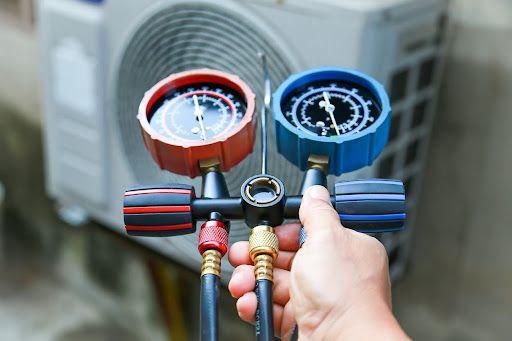Heat Pump Leaking Water: Causes and Solutions

Discovering leaks around your heat pump system can be concerning, as they have the potential to damage both your HVAC system and home. Any signs of heat pump leaks should prompt immediate attention. HVAC.com details the most common causes of a heat pump leaking water and provides solutions to address these issues effectively.
Common Causes of a Heat Pump Leak
Condensate Drain Line Blockages
A clog in the heat pump condensate drain line is often the result of accumulated dirt, debris, algae, or mold. This blockage can lead to water leaks, potentially causing damage to your home and leading to mold growth. Regular heat pump maintenance helps prevent such blockages.
Frozen Evaporator Coil
A heat pump dripping water is often caused by a frozen evaporator coil. Restricted airflow due to a refrigerant leak or a clogged air filter can cause the evaporator to freeze. When the ice melts, it results in a heat pump leak. Regularly changing your air filter and monitoring for refrigerant leaks is the best way to prevent a frozen evaporator coil.
Cracked or Damaged Drain Pan
The drain pan in your heat pump works in conjunction with the drain line. Positioned beneath the evaporator coil, the drain pan collects water generated during the condensation process. The drain pipe then carries this water to an appropriate drainage point. Over time, wear and tear can lead to damage or cracks in the drain pan, potentially causing further issues.
Improper Installation
No matter what type of HVAC system you purchase, it’s crucial to hire a qualified contractor for proper installation. Shoddy installation work, which may involve improper system leveling and poorly connected pipes, not only can cause water leaks but may also result in reduced efficiency and increased energy consumption over time.
Malfunctioning Defrost System
A malfunction in the heat pump’s defrost system can lead to excess ice buildup, resulting in water leakage. It is essential to have your HVAC technician thoroughly inspect and maintain the defrost system to ensure proper operation throughout the year.
Heat Pump Leaking Refrigerant
Water isn’t the only type of leak that can pose issues for your heat pump system. Refrigerant is a crucial component, responsible for removing heat from the indoor air during the warmer months and extracting warmth from outside in winter to effectively heat a home. Manufacturing defects or wear and tear over time can lead to heat pump refrigerant leaks. Handling HVAC refrigerants can be dangerous, requiring the expertise of a professional HVAC contractor.
If you observe a refrigerant leak, contact a reputable HVAC technician promptly. They can recharge the system or recommend replacement based on factors like the amount of refrigerant needed and the age of the heat pump system. Regular HVAC maintenance plays a crucial role in identifying and addressing refrigerant issues promptly.
Maintenance Can Prevent Heat Pump Leaks
Don’t skip out on heat pump maintenance. Resolving issues that may lead to heat pump leaks involves a combination of professional and DIY maintenance. Homeowners should replace their heat pump’s air filter every 2-3 months or according to the manufacturer’s guidelines.
During professional maintenance, HVAC contractors comprehensively inspect the entire system, covering components such as the refrigerant, defrost system, and condensate drain line pan. This thorough examination enables them to identify and address potential issues that could result in leaks.
For those who use their heat pump year-round, it’s advisable to schedule maintenance with an HVAC contractor twice a year – once in the spring and again in the fall. This routine ensures optimal performance and minimizes the risk of heat pump water and refrigerant leaks.